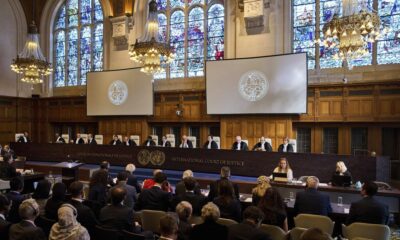On February 6, 2025, U.S. President Donald Trump signed an executive order imposing sanctions on the International Criminal Court (ICC), warning of “tangible and significant consequences” for those behind investigations deemed a threat to U.S. national security and that of its allies, including Israel. This condemnation follows ICC Chief Prosecutor Karim A. Khan’s decision to issue arrest warrants for Israeli Prime Minister Benjamin Netanyahu and Defence Minister Yoav Gallant over alleged war crimes and crimes against humanity in the Gaza Strip.
However, this is not the Trump administration’s first offensive against the ICC. In June 2020, it sanctioned then-ICC Prosecutor Fatou Bensouda and a senior court official after she launched an investigation into alleged war crimes by U.S. troops in Afghanistan. The Biden administration later rescinded the sanctions. While The latest sanctions have prompted key member states such as the U.K., France, and Germany to reaffirm their “unwavering support” for the court, they have also reignited debate over its relevance in the international order amid sustained American repudiation.
Tumultuous relationship
The ICC has always had a contentious relationship with the U.S. While President Bill Clinton’s administration played a pivotal role in the negotiations that led to the court’s creation, it remained wary of the emergence of an independent tribunal that Washington could not control through the UN Security Council. Although Mr. Clinton signed the Rome Statute, he did not send it to the Senate to be ratified, fearing scrutiny of U.S. actions and those of its allies.
When President George W. Bush took office, he launched a hostile campaign against the ICC. His administration pressured governments worldwide to sign bilateral agreements barring the surrender of U.S. nationals to the court. He also enacted the American Service Members’ Protection Act of 2002, which restricted the ICC’s jurisdiction over U.S. military personnel. The law even authorised military action against the court, earning it the nickname “The Hague Invasion Act.”
The U.S. position on the ICC softened during Mr. Bush’s second term when he recognised its potential to serve American interests, particularly in regions where U.S. nationals were unlikely to face prosecution, such as Africa. In 2005, his administration abstained from a UN Security Council vote granting the ICC jurisdiction over war crimes in Darfur, Sudan. This measured engagement continued under the Obama administration, with U.S. diplomats attending ICC conferences. However, cooperation remained conditional, as Washington made it clear that it would support only those investigations that aligned with American interests.
Under the Biden administration, Washington’s double standards in its purported commitment to the “rules-based international order” lay bare when it endorsed the ICC’s arrest warrant for Vladimir Putin while denouncing as “outrageous” the one issued for Benjamin Netanyahu.
‘Low-hanging fruit’
In the aftermath of the Second World War, the Allied powers established the Nuremberg Tribunal, the first international war crimes tribunal, to prosecute top Nazi officials. This gave birth to the idea of a permanent court to hold perpetrators accountable for the world’s most egregious crimes. Although the UN later created ad hoc tribunals to prosecute war crimes in the former Yugoslavia and Rwanda, many international law experts considered them inadequate deterrents.
In July 1998, the UN General Assembly adopted the ICC’s founding treaty at a conference in Rome. Unlike the International Court of Justice, which adjudicates disputes between states, the ICC prosecutes individuals. It complements national courts and intervenes only when they are unwilling or unable to act. A major challenge to its enforcement is the absence of its own police force. Instead, it relies entirely on member states to apprehend suspects. It also cannot try individuals in absentia, requiring member states to arrest anyone under an ICC warrant found within their jurisdiction.
Despite its mandate, the ICC has struggled to gain the membership of major powers, including the U.S., China, and Russia. Some nations have even withdrawn. Burundi left in 2017 after the court decided to investigate its crackdown on opposition protests. In 2019, Philippine President Rodrigo Duterte pulled out, rejecting the ICC’s inquiry into his war on drugs and insisting that domestic courts were sufficient to uphold the rule of law.
African nations, in particular, have expressed discontent towards the court’s tendency to disproportionately target the continent. It was not until 2016 that the court opened an investigation outside Africa — in Georgia — reinforcing perceptions of it being an instrument for advancing Western political interests. The ICC has also been criticised for focusing on “low-hanging fruit” crimes — prosecuting warlords and rebel leaders while failing to hold senior political figures accountable. This frustration was exemplified in 2018 when the court’s appeals chamber overturned the conviction of Jean-Pierre Bemba Gombo, commander-in-chief of the Mouvement de Libération du Congo.
Challenges ahead
Perhaps the most damning criticism of the ICC is its perceived inability to hold the U.S. and its allies accountable. By refusing to ratify the Rome Statute, the U.S. has ensured that the court lacks jurisdiction over crimes committed on its territory or by its military personnel. As a permanent member of the UN Security Council, it can also veto any attempt to initiate a referral through the Council.
With the Trump administration in power, the court is staring down the barrel of four years of punitive measures from Washington. Whether it emerges as a meagre shadow of itself or a resilient international tribunal will depend on the resolve of its member states. They must act decisively to insulate the institution and its staff from America’s coercive diplomacy.
Beyond external pressures, the court faces internal challenges that undermine its standing. Chief among them is the sharp decline in trials. This year, apart from delivering two verdicts, the court will oversee only a single ongoing trial, with no other cases expected to reach the trial stage. Its workload has also diminished significantly, with just 80 hearing days scheduled — a steep drop from the average of 369 annual hearing days recorded over the past eight years (excluding the COVID-related shutdown in 2020).
Further complicating matters is the cloud of sexual harassment allegations against the ICC’s chief prosecutor. In November 2024, the court’s governing body announced an external investigation into the claims, deepening concerns over the institution’s credibility. To preserve its legitimacy and public trust, the ICC must address these internal issues with unwavering transparency and accountability.
Published – February 09, 2025 01:07 am IST







































